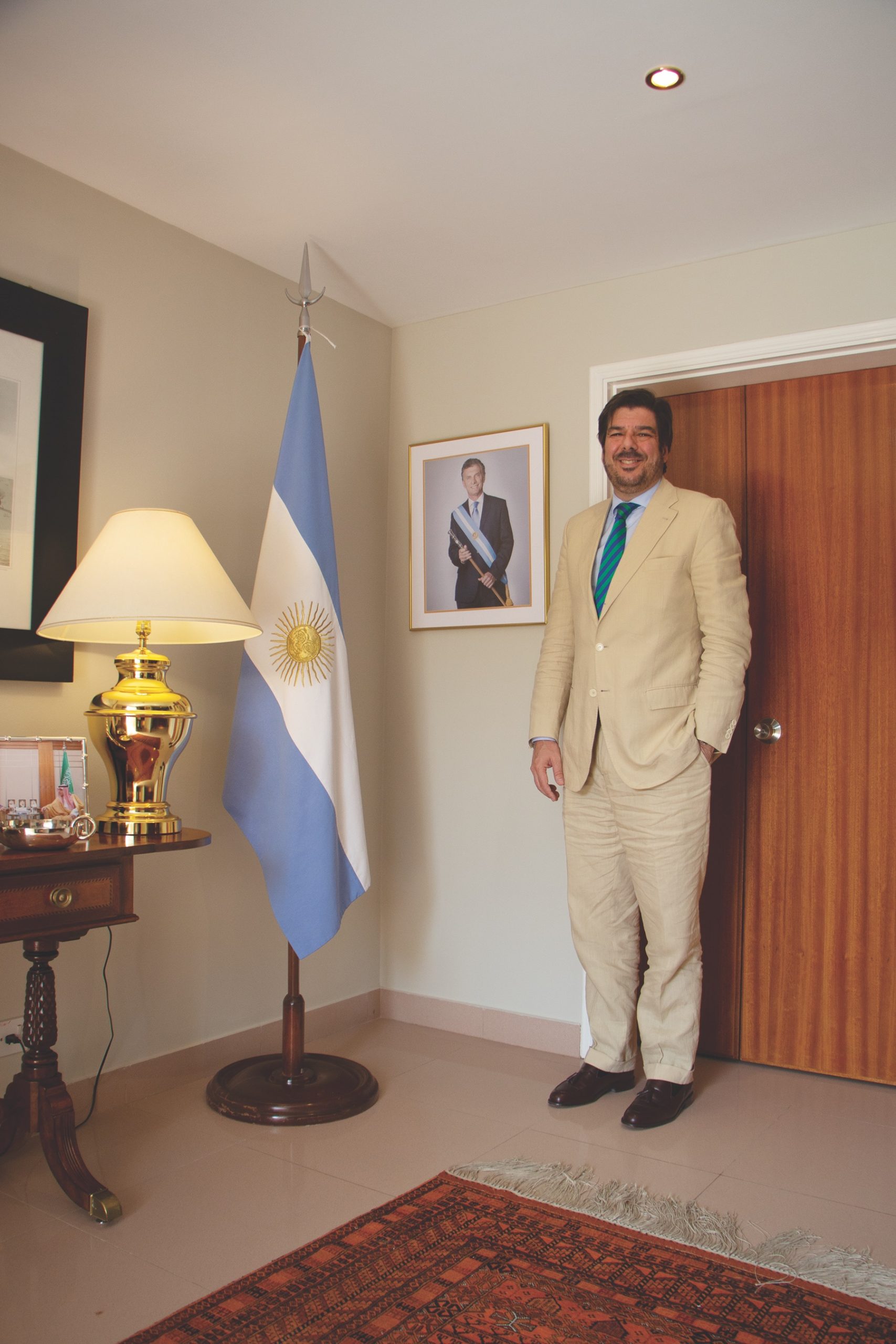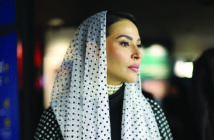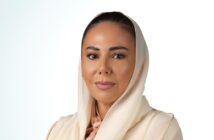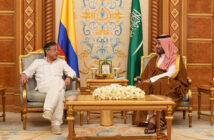Embassy of Argentina
BY ALEXANDER WOODMAN

What inspired you to go into diplomacy?
The story is pretty much unusual and interesting. It was more like a chain. My grandmother wanted my father to be a diplomat, and I wanted to become a diplomat, starting from childhood. This was the reason why I started to study languages at the age of 9. Right now, when I am discussing this question, I think that everything started with my grandmother.
You were living in the United States of America before you moved here? How was the experience?
To be honest, I was living in the States for four years more than 20 years ago, and moved out in the 2000s as a diplomat. I served as a Deputy Consul in Los Angeles, and was dealing with cultural affairs. Afterwards, I moved to Vietnam, where I lived for approximately 6 years. My position was the Deputy Head of Mission. Afterwards, I continued my journey and stayed in Venezuela until 2013 and then back to Buenos Aires. Before finally moving to Saudi Arabia, I was a Deputy Head of Mission in Rome. Being an ambassador here for the first time is challenging, but I am very honored and excited about this.
When were you posted to Saudi Arabia? What was your reaction when you found out that you are coming to Saudi Arabia?
I clearly remember: it was at the end of October 2018. It is not a secret that I like challenges, and to be honest, this is the first time I serve in the region as well. Previously, I was in Jordan, Israel, Qatar, Abu Dhabi, Egypt, Syria, Lebanon, both for holidays and official visits. That’s why despite the fact that I have never been to Saudi Arabia, I knew the region, and was very excited to come here.
What would you say are the most important duties of each Ambassador to increase bilateral relations?
The most important duties for a diplomat are to get involved in local society to understand the culture, and get acquainted with local traditions. For me, Saudi Arabia feels like home, since there are a lot of similarities between our countries. We are here to reinforce bonds and increase the contact points between us. I can say that I was proud to witness the recent visit of the Crown Prince, HRH Prince Mohammed bin Salman bin Abdul Aziz to Buenos Aires.
What are the essential factors needed to forge closer relationships between the two countries in terms of their visions of regional and international issues?
First of all, the most important factor is to strengthen the bilateral bonds through both official and non-official visits in order to reduce the physical distance between us. In my opinion, the duties that have to be highlighted are mingling and meeting with the local society/authorities, and do the follow up of the issues that we were negotiating about.
When considering the formation of the Summit of the South American-Arab Countries (ASPA), what is the most significant impact of this union on the bilateral relations of participant countries?
Historically, the Summit of the South American-Arab Countries (ASPA) was founded more than 10 years ago with a purpose of creating new multilateral forum for discussions between two similar regions, South America and the Middle East with North Africa. It is amazing to observe how historical and social ties unite us.
As of 2016, the two-sided trade volume reached $1 billion, and Argentina has emerged as having the advantage. Can you discuss the current numbers and achievements since that time?
Since my arrival in October 2018, I have been working closely on formatting the commercial relations between us. Therefore, to make this real, I am grateful to the cooperation offered to me by the Saudi Chamber of Commerce, and the interest of Argentinian businessmen to travel to Saudi Arabia.
Which markets, partners, and clients do you feel might best improve the trade between the business sectors of the two countries?
In my opinion, we have to work on improving and augmenting the commercial relations in the field of food, promoting Argentinian beef and poultry products here. Honestly, I was touched when I saw the Argentinian brands in Saudi supermarkets. Currently, we are working on Argentina Week in Saudi, to show one cultural branch of my country. We are going to offer beef, chicken, lamb, fresh fruits and vegetables, nonalcoholic beverages, as well as seafood, both frozen and fresh. It is planned to be realized after this summer. We are looking for local partners, supermarkets, restaurants, as well as hotels. One of our goals is to show in different cities of the Kingdom special products that we have for Saudi. Depending on the budget, we might be bringing some dancers, in order to organize a tango show. Since I am also the ambassador of Argentina to Oman and Bahrain, the particular project will also include these countries.
You occasionally emphasize the rapid progress of the Information and Communications Technology (ICT) sector of the KSA. Please elaborate on the importance of building a digital infrastructure, and its impact on world competitiveness.
Saudi Arabia has witnessed an impressive progress of the Information and Communications Technology, which, in my opinion, can become a “model” for others. In that sense, Argentina, since President Macri assumed in 2015, has witnessed the same development by establishing e-government.
Muslims make up approximately 2% of the population in Argentina. Although they are a small part of the community, it is not strange to be a Muslim in the Argentinian culture. How can people learn the delicate interfaith language, expressed through common humanity, respect, and compassion?
With no doubt I can say that Argentina has always been a country of peace and mutual respect in terms of ethnicity and religion. It is important to mention that the Arab community, both Christian and Muslim, have been working closely in all aspects of Argentinian society.
In 2020, Saudi Arabia will host the 20th Summit of the G20. Please discuss the specific steps you expect to be undertaken to effectively and efficiently increase the vision and strategy of the G20.
I have no doubt that the Saudi G20 Secretariat will find the right topics and visions needed to carry out a successful Summit. As far as I know, Saudi Arabia proved its effectiveness, and always being updated on G20 maters. It is highly important to remember that Argentina together with Japan and the Kingdom are now part of the “troika,” therefore, our work together will continue.
Saudi Vision 2030 is an ambitious endeavor for both for Saudi government and its partners. How do you foresee the role and engagement of Argentina amidst all of this change?
Argentina is already working hand in hand with the government of Saudi Arabia in cooperating in the fields mentioned in the Saudi Vision 2030. In this sense I can remember that recently we signed a Memorandum of Understanding (MOU) in tourism which is a rising topic in Saudi Arabia. It is very exciting for us, and we think we can easily become a strategic partner. Education is one thing we can work on together. Besides that, we are thinking of trade and investments. Another part of Vision 2030 is to sign an air services agreement with Argentina. We are working on having a visa contract, which will facilitate the application process and be beneficial both for Argentina and Saudi.
Can you discuss the educational programs planned to be accomplish between the KSA and Argentina?
I have been in Jeddah for a day a couple of months ago, and visited the King Abdullah University of Science and Technology (KAUST). Currently, we are trying to explore possibilities of cooperation between KAUST and universities in Argentina. Besides that, we have bilateral relations with Saudis, and we are trying to find ways of collaboration in the sphere of education as a whole. We are thinking of offering courses and postgraduate classes for Saudi students in Argentina. In general, we do have some students back there in Balseiro Institute in Bariloche, studying physics, engineering, but we are trying to explore possibilities of further cooperation.
According to the United Nations, Argentina and the Kingdom of Saudi Arabia have an adult literacy rate of 99.13% and 94.4% respectively. In your opinion, other than schools, what can improve people’s literacy and intelligence?
I believe that “curiosity” and “passion” are the answer. From my point of view, curiosity stands for knowing more, and the passion to research and interest yourself in any topic that can enrich your daily life.
Tell us about your life in DQ.
I am not going out that much. Actually, it has been a lot of work since I came here. Argentina was hosting the G20 Summit, where I was one of the representatives and presidents. We were holding it until December, when the presidency was over. Afterwards, in January, we are having the delegation’s wall settling down, which is not an easy task to deal with. Besides that, I was doing some work in the house, which also can be considered as a reason why I was not able to go out a lot. I also traveled around the country. However, life in the DQ is very nice, and every single day is full of events, either national days of other embassies or functions organized by the Saudi government.
Embassy of Argentina
Al Olaya 8 Habeeb Hanthali,
Al 6948, Riyadh 12311
Contact No.: +966 11 465-2600
Email: earab@mrecic.gov.ar
Website: http://earab.cancilleria.gov.ar




